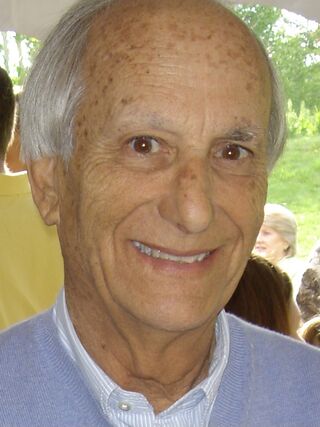Gratitude
Jay Sandrich: Life Lessons From a TV Legend
Director Jay Sandrich recently passed away. His legacy includes advice for life.
Posted October 1, 2021 Reviewed by Ekua Hagan
Jay Sandrich, who passed away at 89 on September 22, enjoyed a long and illustrious run as an Emmy-winning television director. He directed and produced such classics as Get Smart, The Mary Tyler Moore Show, Soap, The Odd Couple, The Bob Newhart Show, and WKRP in Cincinnati, among others.
I knew him for many years and was always struck by his empathy, his humility, his kindness, his gratitude, his awareness of how much of his success belonged to others, and his commitment to helping others.

I interviewed him 15 years ago. Some of his sage advice for leading a good life is presented below.
There are constant obstacles in everyone’s life
“I lost my father when I was young and maybe that really hit me harder than I realized,” he told me. “It was such a blow.” Jay Sandrich’s father, Mark Sandrich, was a film director. Following in his father’s footsteps, Jay, who attended UCLA during the Korean War as part of the Reserve Officers' Training Corps (ROTC), became a motion picture major. When he graduated in 1953, he was commissioned as a Second Lieutenant in the Army and made training films.
Who you are and how you treat people is important
After completing his service, he interviewed for a job as the second assistant director on I Love Lucy. Only after accepting the position did he learn that the man who interviewed him for the job had once been his father’s assistant director. Jack Aldworth became an important mentor too. “This wonderful man literally had to show me everything they did. I didn’t know what I was doing, and Jack just sort of helped me — and did his job and my job at the same time,” he told me.
When Aldworth was promoted to associate producer, he promoted Sandrich to first assistant director. Sandrich was 25.
Lucy Arnaz once revealed to Sandrich that her first job had been on a Fred Astaire and Ginger Rogers film that Mark Sandrich directed. During that job, she got very nervous and couldn’t remember her lines. His father was kind and helpful to her, and Sandrich was always convinced that he rose through the ranks quickly on I Love Lucy because so many people involved in that show loved Mark Sandrich and wanted to help his son succeed. “Lucy and Argyle Nelson, who hired me, still remembered their experiences with my father 10-12 years after he passed away. People who worked with him loved him, and were willing to help me,” he said. “So that was something that I realized I got from my father as his legacy.”
There are always choices
Being an assistant director on I Love Lucy put a lot of pressure on Sandrich. “Number one because I didn’t know what I was doing,” he told me, “and number two because as this young kid, I was sort of caught in the middle of Desi and Lucy. Their marriage was starting to get rocky, and they were at war in many ways. It was really way beyond my capabilities.”
He remembers someone asking him around that time if he would like a “Miltown.” (Miltown was a “tranquilizer” people used at the time to help them deal with anxiety.) Drugs were not prevalent then, Sandrich said. “I don’t think my mother ever sat down with me and said ‘don’t take drugs’ because not many people that I knew at that time were taking drugs… It was a different era.”
He had the thought that if he started taking those kinds of drugs in his 20s he’d be in trouble by the time he was 30. “It wasn’t a conscious decision. I just knew that if I was going to make it in this business, it was going to be constant pressure and I couldn’t start taking things. I had to learn to handle whatever the pressure was.”
When the challenges on I Love Lucy became insurmountable, Sandrich left the show to work for Sheldon Leonard as an assistant producer. “We did The Dick Van Dyke Show, and I kept saying, ‘Sheldon, I'd love to direct it,’ and he said, ‘No, kid. Someday you may be a producer, but you will never make a director’ (because I used to ask questions and bother him all the time). But many years later I received a Directors Guild Award and he presented it. I got up and told that story and he looked at me and said, ‘Well, I was right, was I not?’”
Let go of mistakes
“I really believe we all have it within ourselves to be happy,” Sandrich told me. “In your 20s and 30s and sometimes even 40s you are sometimes not so content with yourself. I got divorced in my late 30s, early 40s, and until then I had never really failed at anything. And of course, you look back at divorce as a failure. Here were two people that had loved each other very much and had raised three kids. Neither my ex-wife nor myself were happy anymore but it really caused me to re-evaluate. I think that forced me to grow as a person; it forced me to question a lot of things that I had believed, and I think it made me much better in my work. And it certainly made me appreciate relationships more.”
Find love and be grateful
"The thing that I'm most thankful for is love. Finding the right wife the second time is the best thing I did. Linda has been really a wonderful asset to my whole family. She has just enriched my life so wonderfully. Being a father and a grandparent is really wonderful. We are close to our grandkids— and they are terrific kids. Both Linda and I really feel we are blessed and lucky, and it's imperative that we try to help other people.
"I hope that when I 'shuffle off,' Linda has a good life and will be a happy person, however long she is around."
♦
Pamela Paresky, PhD, is Visiting Senior Research Associate at the Stevanovich Institute on the Formation of Knowledge at the University of Chicago, Senior Scholar at the Network Contagion Research Institute, and the author of the guided journal, A Year of Kindness. Dr. Paresky's opinions are her own and should not be considered official positions of any organization with which she is affiliated. Follow her on Twitter @PamelaParesky, on Clubhouse @Paresky, and subscribe to her Newsletter: Paresky.Substack.com
positions of any organization with which she is affiliated. Follow her on Twitter @PamelaParesky, on Clubhouse @Paresky, and subscribe to her Newsletter: Paresky.Substack.com




